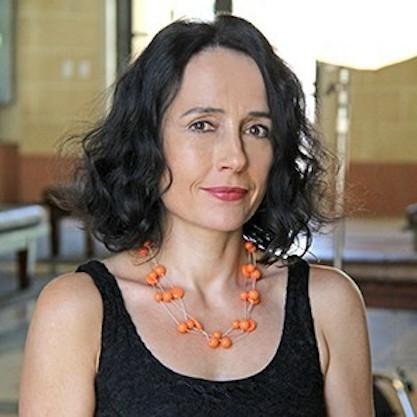Anikó Imre
IAS Q&A
When you arrived at the Institute you probably had a concrete idea or plan of what you would like to achieve during your stay. Were you able to pursue these plans? Did there emerge new, unforeseen directions?
I arrived in Budapest to study the various film and media industries, and more broadly the cultural industries’ interrelationships with the political sphere. My main questions revolved around the political and economic contradictions of the media service industries, where the illiberal, populist Hungarian state prioritizes attracting and serving global productions. For my research, the most valuable thing I did was interviewing many wonderful people working in, around and with the media industries, who generously shared their time and insight with me. I have yet to properly process most of these interviews, but I have already noted instances where they nuanced or redirected my preconceptions. I also gave a handful of interviews and over 10 talks and guest lectures during my time, both at the CEU Budapest and Vienna but also in Pécs, Debrecen, Bucharest and other places. All of these encounters provided me with tons of valuable feedback for going forward.
More generally speaking, who or what influenced your work and research path the most?
I left Hungary in the 1990s, as I was finishing my studies at the University of Szeged (then JATE). At that time, there was still a considerable gap between the questions and methods that animated the humanities in Hungary and the post-socialist region more broadly, and in what was then more explicitly considered “the West.” So, encountering critical studies of gender, sexuality, race and ethnicity, postcolonial theories, film and media studies and cultural studies at the University of Warwick (under the mentorship of Charlotte Brunsdon) was an eye-opening experience for me. At the beginning, including my subsequent PhD studies at the University of Washington, I deliberately positioned myself in this gap, where I could put in conversation “Western” and “Eastern” European paradigms. This foundational orientation towards cultural translation in issues of media, politics and identity is still crucial but my questions have shifted along with the radical geopolitical, technological and epistemological transformations of the past 30 years.
To which debates or schools of thought do you see your research contributing?
Most broadly, I would place myself in comparative cultural, media and communication studies. When it comes to actual disciplines, also reflected in the venues that I contribute to and the collaborations I participate in, I feel at home in a variety of places across cinema and media studies, media history, media industry studies, television studies, popular communication, (post)socialist studies, critical data and surveillance studies, studies or race and ethnicity and feminist studies.
How do you see your field of research today, how is it evolving?
My research fields have been morphing, merging and globalizing. In fact, it is becoming increasingly hard to map out “fields” any more. They’re responsive to geopolitical challenges, such as the spread of populism and illiberalism, genocidal wars in Ukraine or Gaza, decolonization, surveillance capitalism, and movements such as #metoo and Black Lives Matter. But these rapid responses also sometimes produce somewhat simplified reactions. I’m more interested in inquiries that deeply and seriously consider how we can understand our crisis-ridden, globalized reality in terms of new or revised theoretical paradigms. This of course requires looking back and assessing the value and usefulness of available historical paradigms, rather than simply casting them away as outdated. So, my positioning in and across fields is a process of creative thinking and building forward while constantly looking back and reevaluating. I’m always most attracted to concepts and metaphors that are capacious enough to carry this double movement across the disciplines, such as play and games in my older work and fantasy, storytelling and worldbuilding in my current project.
How is life after IAS CEU Budapest (if we may ask)?
Back to the grind! My stay in Budapest, as wonderful and productive as it was, sadly, didn’t feel long enough to actually take a break from my regular job at USC, so the re-entry into teaching, mentoring, committee work etc. has been fairly seamless. I’m trying to keep alive the sense of joy, curiosity and freedom that I was lucky enough to enjoy while in Budapest, and set aside time to immerse myself in the culture of my other home city, Los Angeles.
If there were one book or film you could recommend to the reader, what would be that and why?
Like many others, I’m reading Naomi Klein’s latest book, Doppelganger. Very timely, as I’ve been alert to the return of the “double” figure across popular culture, and also a great read, as her books always are. I’m also watching Barry, the HBO Max original series – which also happens to be an allegory of doubling.

